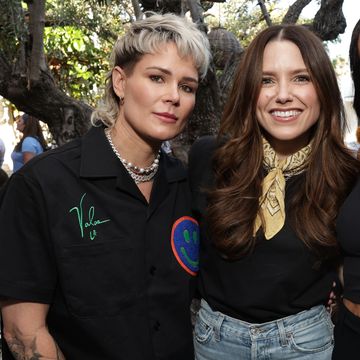Falling in love can be emotional, exhilarating, and euphoric all at once. Your heart is beating fast, you have nonstop butterflies, and everything seems blissful during the honeymoon phase. But then, years later, you might notice a shift—maybe you’ve been fantasizing about being single, or seeing other people. Perhaps your partner’s once-endearing traits are seriously getting on your nerves. Maybe you can't help but wonder (and, consequently, Google) if you’re falling out of love with your partner...
Truth is, relationships naturally change over time, and it’s common to grow apart—even if neither partner has done anything “wrong.” And while falling out of love with someone could mean the relationship's over, it's also possible to reignite that romantic spark through effort and time.
“It’s normal for partners to feel a sense of ‘falling out of love’ now and again,” says Carla Marie Manly, PhD, a clinical psychologist and author of The Joy of Imperfect Love. Sometimes, feelings within relationships might shift due to clear-cut changes or betrayals like infidelity. But in most cases, the shift from being “in love” to being “out of love” is slow and subtle, says Manly—and often, it’s due to a variety of factors rather than a single issue.
“Mental health challenges, learning new things about yourself, changes in your identity, or a shift in your personal values are all internal reasons a person’s feelings may change about their partner,” says Nikki Coleman, PhD, a licensed psychologist and sex self-confidence coach based in Texas. You may also fall out of love due to external factors, like dealing with financial stress, having a child, or spending too much time apart.
Meet the Experts:
Carla Marie Manly, PhD, is a clinical psychologist and author of The Joy of Imperfect Love.
Nikki Coleman, PhD, is a licensed psychologist and sex self-confidence coach based in Texas.
Kalley Hartman, LMFT, is a licensed marriage and family therapist and clinical director at Ocean Recovery.
Brandon Santan, PhD, is a Chattanooga-based licensed therapist who specializes in relationships.
Surabhi Jagdish, LMFT, is a licensed marriage and family therapist and owner of Revolutionary Reflections in Houston.
Just like falling in love, falling out of love looks different for everyone. “For some, it may mean that something has changed in the relationship and there is no longer the same connection as before,” says Kalley Hartman, LMFT, a licensed marriage and family therapist and clinical director at Ocean Recovery. It could also mean a general change of emotions toward your partner, and for others, it could mean the end of a relationship or marriage.
“No matter what it means for you, it’s important to acknowledge when you feel like something has shifted,” Hartman says. From there, you can really decide what you need to do next—but first, here's how to tell if you've lost that loving feeling:
What are the signs I'm falling out of love?
Here are ten signs you might be falling out of love with your partner, according to relationship therapists.
1. You feel apathetic about your relationship and where it's headed.
Unlike the honeymoon phase when enthusiasm is heightened, falling out of love is often marked by a sense of apathy or ambivalence. Hartman calls this “relationship fatigue”—a.k.a., when you feel drained and have less motivation to keep the connection going. “Over time, we may start to feel overwhelmed by our relationships, leading us to become tired or apathetic about investing energy in them,” she says.
Relationship fatigue can look like being disengaged from your partner, generally uninterested, or even cynical about your future together. You may forget important milestones, stop prioritizing quality time together, or feel like putting in the effort is a chore. If any of these apply to you, it may be a sign you’re falling out of love.
2. You’re not communicating with your partner the way you used to.
If you find yourself avoiding your partner and checking out of emotional (or even lighter) conversations, it’s probably a warning sign. “This may show up as avoiding conversations, not making time to spend together, or having difficulty communicating feelings and ideas,” Hartman says. You may even start to shut down or hide your true thoughts from them, which can create emotional distance (and resentment) over time.
3. You find yourself creating physical distance.
“When someone is falling out of love, they may become emotionally distant, avoid physical intimacy, stop expressing affection, or appear detached and unresponsive to emotional needs,” says Brandon Santan, PhD, a Chattanooga-based licensed therapist who specializes in relationships.
It’s normal to crave alone time every so often (e.g., when you’re both feeling stressed, or after a long day at work), but if you’re not interested in connecting the majority of the time, it’s probably a sign the relationship is changing. “A noticeable decline in enthusiasm and interest in spending time together, engaging in shared activities, or discussing future plans may suggest that feelings are fading,” Santan says.
4. There’s an increase in conflict (or lack of interest in resolving it).
Conflict is a natural part of relationships, but sometimes, too much friction can indicate that love is dissolving. “When there is more conflict than connection, it is time to look at and address what has changed and get curious about why that is,” Coleman says.
A partner who is falling out of love may instigate conflict as a means of creating distance in the relationship, according to Manly, but it’s even more telling when there’s no interest in making peace at all. “Although ongoing conflicts are never a good sign in a relationship, a lack of interest in resolving the root issues is often a sign that feelings of love have waned—or that there was an inability to create lasting love from the onset,” she explains.
5. You’re not as interested in quality time as you used to be.
Thoughtfully-planned date nights and spontaneous weekend trips may have been the norm when you first got together, but if you’re significantly less eager to spend QT with your S.O. nowadays, it could be a red flag. “Maybe you used to enjoy activities together, but now find yourself not wanting to engage in the same way,” Hartman says.
The disconnect can apply to quieter everyday moments, too, adds Coleman: “When you don't feel excited about your partner or the idea of spending time with them—especially doing the mundane tasks of life—it is likely that you are not feeling as in love anymore.”
6. Intimacy and sex are minimal or nonexistent.
There are many different types of intimacy (including non-physical) that can strengthen your connection. But when intimacy no longer exists, it can feel impossible to experience love. “If the idea of physical touch or intimacy feels like something you'd rather not do and you don't have much desire to engage in it, this could be a sign [you're falling out of love],” says Surabhi Jagdish, LMFT, a licensed marriage and family therapist and owner of Revolutionary Reflections.
There are many reasons your (or your partner’s) sex drive might ebb and flow, and having sex or being intimate less frequently doesn’t automatically mean you’re falling out of love. But it can indicate that something is off—especially if there’s a complete lack of communication, and no interest in fostering other forms of connection.
“Partners who are deeply connected on an emotional level tend to move through the natural highs and lows of sexual intimacy with grace,” Manly says.
7. You fantasize about being single or seeing other people.
Put simply: “Constant daydreaming or expressing a desire to be single or explore other options may indicate that [you are] contemplating a life outside the relationship,” Santan says. For instance, you may fantasize about single life, feel jealous of your single friends, or think about being with other people.
If you’ve been in a monogamous relationship for a while, it’s normal to have crushes (everyone is human!), but if you’re regularly entertaining the idea of life without your partner and think you’d be better off without them, it's likely a sign that love is fading.
8. You’re not making plans for the future.
During the honeymoon phase, it’s hard to imagine life without your partner. But when falling out of love, you may doubt whether or not you want to face the future together. “Partners who are falling out of love often stop making plans for the future,” Manly says. “For example, a partner who shows no interest in planning future vacations or creating shared goals may be signaling that they have one foot out the door.”
9. Their quirks and flaws feel increasingly annoying.
It’s normal to get on each other’s nerves a little—nobody is perfect! But if you’re constantly feeling frustrated or if your partner’s quirks, behavior, and personality seem to get on your nerves more than usual, it could be a sign you're no longer feeling the love. “Growing disinterest or dissatisfaction in the relationship can lead to more frequent arguments, nitpicking, or a general sense of frustration and tension between both partners,” Santan explains.
10. Your lives are moving in different directions that don’t feel aligned.
Falling out of love may happen naturally due to partners taking different life paths that feel very separate, Manly says.
“Loving partnerships rely on communication, togetherness, shared ventures, and connective play. If partners routinely take paths that leave each person feeling separate and alone, the loving bonds often fade away,” she says. When one or both partners feel continuously “unseen or unloved,” Manly adds, it’s more likely that someone is falling out of love.
Okay, I might be falling out of love with my partner. What do I do next?
If you think you’re falling out of love, know that it’s a common experience—you’re not alone, and it’s not your fault. “It's not uncommon for the intensity of romantic feelings to fluctuate over time,” Santan says. “Falling out of love doesn't necessarily mean the end of the relationship. It can be an opportunity for growth and re-connection.”
It’s important to understand the root of the issue before making any big decisions, Manly adds. “In some cases, the issue has nothing to do with a partner’s behavior and is solely related to stress, unresolved internal issues, or personal shifts,” she explains. “Self-reflection—including journaling, meditating, and seeing a therapist—is often a key part of the journey.”
Additionally, Santan recommends evaluating your overall compatibility, any shared values, and the long-term goals of your relationship. “Determine whether the issues you are facing are temporary or if they point to deeper incompatibilities that may be difficult to overcome. This assessment can help you gain clarity on whether the relationship is salvageable or if it may be healthier for both parties to move on,” he says.
It can be tough to admit you’re falling out of love, and even trickier to communicate it to your partner. Even so, Santan suggests initiating an honest, compassionate conversation with them about your feelings. “Choose a suitable time and place to express your thoughts, concerns, and doubts,” he says. “Clearly communicate your emotional state and be open to listening to their perspective as well. Keep in mind that effective communication is key to understanding each other and finding potential solutions.”
You might say something like, “Hey, there’s something I’ve been wanting to talk to you about. Sometimes, it feels like our connection has changed… do you ever feel that way, too?” It may feel intimidating, but take a deep breath and be sincere. Who knows? Maybe your partner has been feeling the same way, too, and the conversation can be a healing experience for you both.
Eventually, you may decide that the relationship can be repaired—or that it’s time to end things. You may also want to take a break to reassess or seek couples therapy to help you navigate the situation. “Based on the self-reflection, communication, and professional guidance, you will eventually need to make a decision about the future of your relationship,” Santan says. “Remember that this decision should be made with careful consideration of your own well-being and the well-being of your partner.”
Is it possible to fall back in love?
Some good news: It is! “You can absolutely fall back in love with your partner,” Coleman says. “As much as you change and grow over time as a person, so must your relationship. The goal is to find new ways to rediscover each other and pursue the experience of being in love with them over and over again.”
Experts agree that a combination of self-reflection, communication, an effort to rekindle intimacy, and an active investment in quality time can help you fall back in love. “Falling back in love takes time and effort from both partners. It may not happen overnight, and patience, understanding, and commitment are key,” Santan explains. “However, if both individuals are willing to put in the work and are open to growth, it is possible to rediscover the love and connection that initially brought them together.”
One way: Remember what you loved about your partner at the beginning of your relationship, Jagdish suggests. “Take some time to ask yourself, 'What attracted me to my partner? What helped me fall in love in the first place? What are some things I said or did but don't anymore? What are some things they said or did but don't do anymore? Are these things I still experience or notice with my partner?’” she says. “If you can identify these things, look for them in your relationship again.”
Falling out of love can be an overwhelming experience, and only you know what’s best for you. If you’re in a low spot, try not to be hard on yourself or your partner—and whether you decide to rebuild or end the relationship, know that you deserve happiness and all the joy that lasting love can bring.
Tianna Soto is the Associate Health and Wellness Editor at Women’s Health. Her writing on wellness and relationships has been featured in Cosmopolitan, Elite Daily, Glamour, mindbodygreen, and more. She holds a M.A. in clinical psychology in education from Columbia University and is a certified yoga instructor. When she’s not writing, you can find her traveling, trying new workout classes, and speaking with audiences about mental health.












